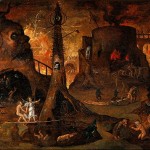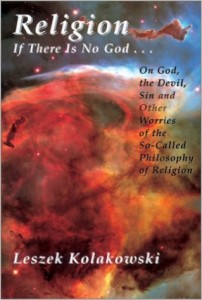 Religion: If There is No God…on God, the Devil, Sin and Other Worries of the So-Called Philosophy of Religion, Leszek Kolakowski
Religion: If There is No God…on God, the Devil, Sin and Other Worries of the So-Called Philosophy of Religion, Leszek Kolakowski
Leszek Kolakowski discusses, in a highly original way, the arguments for and against the existence of God as they have been conducted through the ages. He examines the critiques of religious belief, from the Epicureans through Nietzsche to contemporary anthropological inquiry, the assumptions that underlie them, and the counter-arguments of such apologists as Descartes, Leibniz, and Pascal.
His exploration of the philosophy of religion covers the historical discussions of the nature and existence of evil, the importance of the concepts of failure and eternity to the religious impulse, the relationship between skepticism and mysticism, and the place of reason, understanding, and in models of religious thought. He examines why people, throughout known history, have cherished the idea of eternity and existence after death, and why this hope has been dependent on the worship of an eternal reality. He confronts the problems of meaning in religious language.
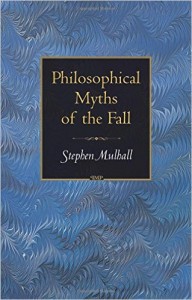 Philosophical Myths of the Fall, Stephen Mulhall
Philosophical Myths of the Fall, Stephen Mulhall
Did post-Enlightenment philosophers reject the idea of original sin and hence the view that life is a quest for redemption from it? In Philosophical Myths of the Fall, Stephen Mulhall identifies and evaluates a surprising ethical-religious dimension in the work of three highly influential philosophers–Nietzsche, Heidegger, and Wittgenstein. He asks: Is the Christian idea of humanity as structurally flawed something that these three thinkers aim simply to criticize? Or do they, rather, end up by reproducing secular variants of the same mythology?
Mulhall argues that each, in different ways, develops a conception of human beings as in need of redemption: in their work, we appear to be not so much capable of or prone to error and fantasy, but instead structurally perverse, living in untruth. In this respect, their work is more closely aligned to the Christian perspective than to the mainstream of the Enlightenment. However, all three thinkers explicitly reject any religious understanding of human perversity; indeed, they regard the very understanding of human beings as originally sinful as central to that from which we must be redeemed. And yet each also reproduces central elements of that understanding in his own thinking; each recounts his own myth of our Fall, and holds out his own image of redemption. The book concludes by asking whether this indebtedness to religion brings these philosophers’ thinking closer to, or instead forces it further away from, the truth of the human condition.
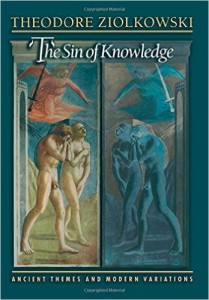 The Sin of Knowledge, Theodore Ziolkowski
The Sin of Knowledge, Theodore Ziolkowski
Adam, Prometheus, and Faust–their stories were central to the formation of Western consciousness and continue to be timely cautionary tales in an age driven by information and technology. Here Theodore Ziolkowski explores how each myth represents a response on the part of ancient Hebrew, ancient Greek, and sixteenth-century Christian culture to the problem of knowledge, particularly humankind’s powerful, perennial, and sometimes unethical desire for it. This book exposes for the first time the similarities underlying these myths as well as their origins in earlier trickster legends, and considers when and why they emerged in their respective societies. It then examines the variations through which the themes have been adapted by modern writers to express their own awareness of the sin of knowledge.
Each myth is shown to capture the anxiety of a society when faced with new knowledge that challenges traditional values. Ziolkowski’s examples of recent appropriations of the myths are especially provocative. From Voltaire to the present, the Fall of Adam has provided an image for the emergence from childhood innocence into the consciousness of maturity. Prometheus, as the challenger of authority and the initiator of technological evil, yielded an ambivalent model for the socialist imagination of the German Democratic Republic. And finally, an America unsettled by its responsibility for the atomic bomb, and worrying that in its postwar prosperity it had betrayed its values, recognized in Faust the disturbing image of its soul.
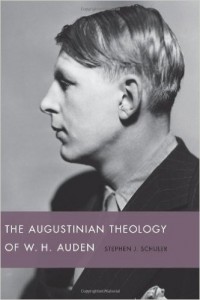 The Augustinian Theology of W.H. Auden, Stephen Schuler
The Augustinian Theology of W.H. Auden, Stephen Schuler
When W. H. Auden returned to Christianity in the early 1940s, he identified himself with what he called an “existential” method of spiritual and literary inquiry, which the writings of St. Augustine helped him define as a mode of thinking that not only allows for human subjectivity, but emphasizes the hopes, fears, needs, desires, and anxieties of the individual. Augustine thus became for Auden a model of a thinker who seamlessly merged psychological reflection with philosophical speculation and theological insight, and it is this combination of introspection and theoretical investigation that shapes much of Auden’s later poetry.
The Augustinian Theology of W. H. Auden illustrates that Augustine’s thought is a major influence on Auden’s postconversion poetry and prose. Auden encountered Augustine both directly, through his reading of the Confessions, and indirectly, through several of Auden’s contemporaries, such as Reinhold Niebuhr, Charles Norris Cochrane, and Charles Williams. Stephen J. Schuler argues that Augustine provided Auden with the language of privation to describe the nature of moral and social evil, enabling him to make sense of the pervasive anxieties produced by World War II. Augustine’s works also offered Auden a rationale for his intuition that the physical world, and especially the human body, is intrinsically good. Auden’s struggle to reconcile the implications of his Augustinian theology with his attitudes toward romantic love and sexuality are explained by Schuler, who demonstrates how the Augustinian theology of Reinhold Niebuhr helped shape Auden’s ideas about human identity and community, which is defined and maintained by love in all its various forms. Finally, Schuler analyses Auden’s Augustinian view of the ethics of poetry.

